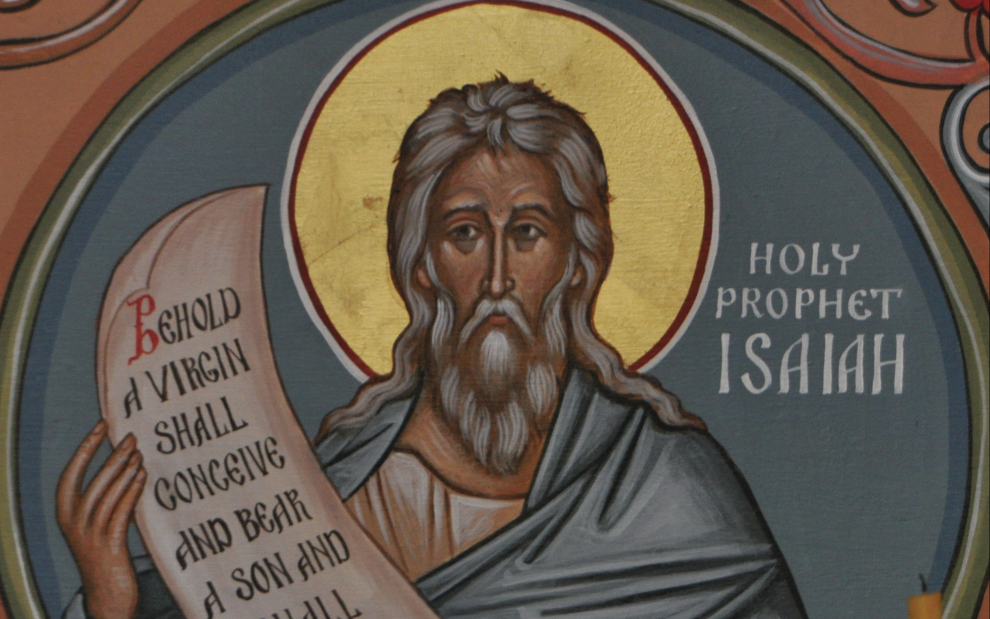This whole blighted year I’ve waited for Isaiah with the agonized impatience children suffer for the arrival of Santa. Not that Isaiah is as rare a visitor as the gent with the sleigh. We’ve heard from Isaiah on 26 Sundays this past liturgical cycle—exactly half the time. If you followed the daily Mass readings through lockdown, double those encounters. Apart from the evangelists, the only biblical writer who bends our ear more than Isaiah is St. Paul.
But Isaiah is a seer of many moods, not all of them gentle. He can be the messenger who warns of God’s vengeance familiar in the “Battle Hymn of the Republic”: “I have trodden the wine press alone. . . . I trod them in my anger and trampled them in my wrath” (Isa. 63:3a).
Isaiah is also the grim prognosticator of Holy Week, lamenting a just yet mistreated servant enduring unbearable cruelty: “He was oppressed, and he was afflicted, yet he did not open his mouth; like a lamb that is led to the slaughter” (53:7a).
The eighth-century B.C.E. prophet is often bluntly admonishing: “Cease to do evil, learn to do good” (1:16b–17a). He is pointed in how to course-correct: “Seek justice, rescue the oppressed, defend the orphan, plead for the widow” (1:17b).
We tend to regard apocalypse as something that occurs at the tail end of the Bible. In fact this symbolic, hidden language of destruction for the sake of restoration can be found all over scripture. Isaiah is no stranger to its evocative authority: “For I am about to create new heavens and a new earth; the former things shall not be remembered or come to mind” (Isa. 65:17).
Messenger of doom. Revealer of messianic suffering. Advocate for justice. Apocalyptic visionary. None of these facets of Isaiah’s repertoire are why I’ve been fretful for his return during this long, difficult year. The Isaiah I’ve longed for is the herald of the Advent prophecies. I didn’t wait for Advent to begin before humming that rousing Reformation hymn score, “Genevan 42”:
Comfort, comfort now my people;
speak of peace—so says your God.
Comfort those who sit in darkness,
burdened by a heavy load.
To Jerusalem proclaim:
God shall take away your shame.
Now get ready to recover;
guilt and suffering are over.
This hymn is a lyrically enhanced version of the opening of Isaiah, Chapter 40. It’s followed by an even better known passage used by gospel writers to describe the career of John the Baptist: “A voice cries out: ‘In the wilderness prepare the way of the Lord.’ ” We know what happens after that: Valleys are lifted, mountains leveled, flesh is pronounced grass—yet the word of the Lord stands forever.
Honestly, I’ll take Isaiah 40, line for line, over every sympathy card on the rack. We’ve sat in darkness enough this year. We’ve seen the daily reality of human flesh mowed down like grass. I’ve wept at the death of a dear friend who passed from this world without a chance to sit together, hold hands, look into each other’s eyes one last time, and say thank you.
I am ready to recover from so much grief, so very ready to put off guilt and suffering and to experience that deep comfort and peace only available in the gracious presence of a God who covers all sin and restores hope.
Chapter 40 ends with the verse: “Even youths will faint and be weary, and the young will fall exhausted; but those who wait for the Lord shall renew their strength, they shall mount up with wings like eagles, they shall run and not be weary, they shall walk and not faint” (Isa. 40:30–31). Paint these words across the walls of every city. To a pledge like this, all we can say is Amen.
Honestly, I’ll take Isaiah 40, line for line, over every sympathy card on the rack.
Advertisement
This might sound like a big dose of Bible study. Considering what we’ve been through in 2020, it’s the most intimate address in scripture this side of Jesus. The Book of Isaiah, remember, is also known as the fifth gospel. If Isaiah had inhabited the streets of the first century along with Matthew, Mark, Luke, and John, he couldn’t have been more truly aligned with their portrait of Jesus.
Yet from a distance of eight centuries before their generation, in an increasingly threatened Jerusalem, this seer perceived the aching need humanity has for an Emmanuel, a God-with-us, to walk with us and rescue us from our bleak, blind stumble through history’s darkness.
Is it any wonder that, a century after this great visionary, students of Isaiah were still adding to his scroll from exile in Babylon? It seemed clear to them that the danger Isaiah had foreseen had been horribly realized. Others continued to write under Isaiah’s name after returning from exile to the sad rubble of Jerusalem. They quickly realized that liberty in an impoverished, ruined city is a captivity all its own.
This year, flesh fell like grass around the globe. Indifferent graphs record more than a million deaths from a virus that started out, for most of us, as a half-heard footnote on the nightly news. Meanwhile, all the old ways to die remain bitterly in place: poverty, wars, cancers, racially motivated brutality, domestic violence. Many perish from simple despair. So we’ve all done our best to support friends faltering under the domino effect of too many crushing losses. We’ve watched family members mentally buckle under relentless layers of disappointments. I’ve had nights so low I wanted to surrender to numbness and poor choices—anything to keep the pain at bay. It’s just been a lousy cesspool of a year.
Is it any wonder that, a century after this great visionary, students of Isaiah were still adding to his scroll from exile in Babylon?
Comfort, comfort. My family includes hard-working teachers who returned to hybrid classrooms this fall to do their best with the children in their care. They feel like soldiers on foreign soil, keeping a wary eye for the invisible enemy. A young niece had to suck up the last-minute news that the trunk she’d packed for her first year of college would have to be shoved back into her bedroom: The university determined to go virtual for the time being. An older niece works in a nursing home. For nine months now, she’s risked her own safety each shift to enter a lake of fear, sickness, and dying. Other family members would be grateful to be working at all, having lost their paychecks back in March.
We each have a tabulation of losses that continues to mount with no clear end in sight. Yes, we trust the vaccine will come, the curve will flatten, jobs will pop back into view, travel will be restored. Next spring, we hope, will be better than the last one. Our frayed nerves will mend in time. Maybe by next Thanksgiving we can enjoy the traditional gathering that seems all the more precious now than before. In these ways and more, we can believe with some justification that comfort is on its way.
Yet if prophecy says anything, it’s that we can’t just crawl back into the hole that led to this crisis. A year of exile from the world we knew has exposed a multitude of cracks in our culture: alarming disparities that testify to injustices that go bone-deep. As we pick up the pieces and emerge from the darkness this time, we have a chance not merely to restore but to reimagine. Is there a way, this time, to bring the comfort to everyone, and not just to the privileged ones? Let’s cease doing evil, learn to do good. That would be some kind of Christmas.
This article also appears in the December issue of U.S. Catholic (Vol. 85, No. 12, pages 47-49). Click here to subscribe to the magazine.
Image: Flickr.com/bobosh_t
















Add comment